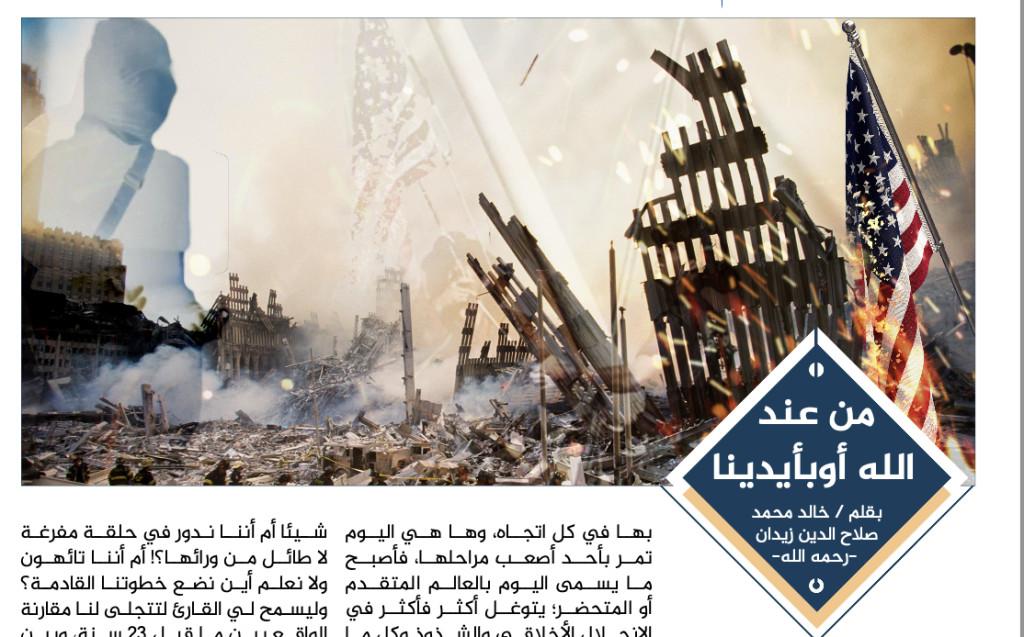
Al Qaeda’s enduring challenge: A vision of victory over America
“In the language of numbers, we can see the magnitude of the huge losses that the Mujahideen inflicted on America—thanks to Allah.” – Khaled Mohammad Salah Din Zaydan.
These words, penned by the late Khaled Mohammad Salah Din Zaydan, the son of al-Qaeda leader Sayf al-Adl, and published in the latest issue of al-Qaeda in Arabian Peninsula’s magazine Sada al-Malahem, resonate with a stark reminder of al-Qaeda’s unwavering resolve.
From regional conflicts like the Gaza War to operational updates from Shabaab in Somalia, al-Qaeda not only declares victory over America but also showcases a strategy skillfully adapting to the global geopolitical landscape. While Zaydan’s voice has been stilled with his recent alleged death in Yemen, his message continues to articulate al-Qaeda’s strategic visions and its perceived victories in a conflict it declares far from over.
The article penned by Zaydan describes one story: Al-Qaeda believes it is not only surviving but thriving.
Zaydan’s narrative thus reverberates with al-Qaeda’s foundational principles, portraying the struggle as eternal: a “battle between truth and falsehood… destined to continue until the hour of Judgment.” This eschatological view serves as both a rallying cry and a strategic tool, recruiting and radicalizing followers under the banner of divine victory in what they frame as a historical inevitability.
Zaydan then asserts, “the victory is because of God, and the fruits of your patience and steadfastness… the upcoming conquest will be written in your blood—God willing.”
He contrasts this divine mission with historical grievances, where periods of non-Islamic rule caused widespread suffering, advocating for Islamic governance as not just preferable but divinely ordained. This portrayal galvanizes support by depicting Muslims as perennial victims of Western dominance.
Zaydan turns to marks significant milestones in reducing American global influence, stating, “before 9/11 and after the Soviets’ defeat… America has assumed world sovereignty… here I am speaking in past tense.” He also identifies the September 11 attacks as a turning point, heralding the “end of the American era” – a strategic success demoralizing foes while inspiring adherents.
At the heart of his argument lies the economic toll of al-Qaeda’s campaigns. He further notes, “American public debt stood at 3.4 trillion dollars before the 9/11 attacks… today, it exceeds 33 trillion dollars!”
By spotlighting the financial strains—such as the surge in U.S. national debt and the costs of prolonged wars—al-Qaeda depicts a weakening superpower, supposedly buckling under the weight of its military overreach.
“The war in Afghanistan has ended, however, America is still paying its cost and will continue,” Zaydan notes, illustrating the effectiveness of al-Qaeda’s prolonged war strategy. He then underscores the psychological victories through sustained conflict, highlighting the enduring costs of wars and American security measures as signs of U.S. vulnerability and overextension.
Moreover, Zaydan positions al-Qaeda as a central figure in the global struggle against Western influence, aiming to inspire and coordinate jihad across various geographies.
He ultimately concludes the article with a potent call to arms, urging followers to persist until they secure ultimate victory—governance by divine law. This commitment underscores al-Qaeda’s goal to establish a widespread Islamic caliphate with significant global influence.
Al-Qaeda’s continued, but largely ignored threat
The recent article by Zaydan ultimately outlines how al-Qaeda currently sees itself and how it seeks to continue its decades-long jihad.
As al-Qaeda under al-Adl’s leadership continues to articulate a vision of victory and resilience through a sophisticated blend of ideological warfare and strategic propaganda, Washington should heed this not as mere rhetoric but as a clarion call to recalibrate our counter-terrorism strategies.
If the U.S. government continues to dismiss al-Qaeda’s narratives as the last throes of a dying movement, it risks ignoring the evolution of a threat that thrives on being underestimated. Al-Qaeda’s portrayal of itself as a phoenix rising from the ashes of Afghanistan’s battlefields should disturb us all—not only because it claims to weaken a superpower but because it aims to reshape global politics.
Let this be a wake-up call: al-Qaeda’s narrative of triumph could spell a dangerous new chapter in global terrorism unless the U.S. acts decisively. The battle for hearts and minds is not just about countering narratives; it’s about offering a compelling alternative that diminishes the allure of extremist ideologies. The time to bolster defenses and rethink strategies is now, before the next narrative of victory is written not in words, but in blood.
Source » longwarjournal





